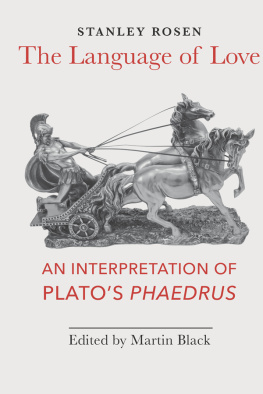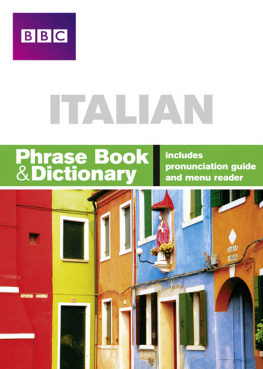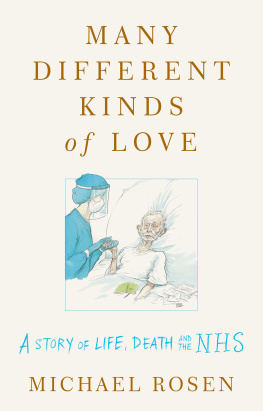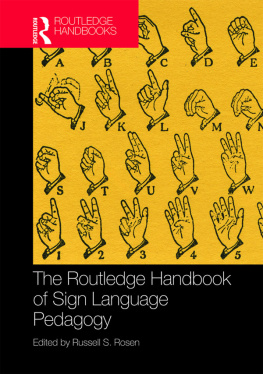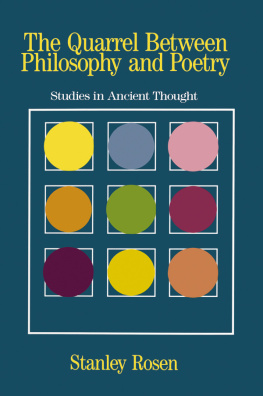Stanley Rosen - The Language of Love
Here you can read online Stanley Rosen - The Language of Love full text of the book (entire story) in english for free. Download pdf and epub, get meaning, cover and reviews about this ebook. year: 2021, publisher: Chicago Distribution Center (CDC Presses), genre: Science. Description of the work, (preface) as well as reviews are available. Best literature library LitArk.com created for fans of good reading and offers a wide selection of genres:
Romance novel
Science fiction
Adventure
Detective
Science
History
Home and family
Prose
Art
Politics
Computer
Non-fiction
Religion
Business
Children
Humor
Choose a favorite category and find really read worthwhile books. Enjoy immersion in the world of imagination, feel the emotions of the characters or learn something new for yourself, make an fascinating discovery.
- Book:The Language of Love
- Author:
- Publisher:Chicago Distribution Center (CDC Presses)
- Genre:
- Year:2021
- Rating:4 / 5
- Favourites:Add to favourites
- Your mark:
- 80
- 1
- 2
- 3
- 4
- 5
The Language of Love: summary, description and annotation
We offer to read an annotation, description, summary or preface (depends on what the author of the book "The Language of Love" wrote himself). If you haven't found the necessary information about the book — write in the comments, we will try to find it.
The Language of Love — read online for free the complete book (whole text) full work
Below is the text of the book, divided by pages. System saving the place of the last page read, allows you to conveniently read the book "The Language of Love" online for free, without having to search again every time where you left off. Put a bookmark, and you can go to the page where you finished reading at any time.
Font size:
Interval:
Bookmark:

Other Books of Interest from St. Augustines Press
Stanley Rosen (Martin Black, editor), Essays in Philosophy: Ancient
Stanley Rosen (Martin Black, editor), Essays in Philosophy: Modern
Stanley Rosen, Metaphysics in Ordinary Language
Stanley Rosen, Nihilism: A Philosophical Essay
Stanley Rosen, Platos Statesman: The Web of Politics
Stanley Rosen, Platonic Productions: Theme and Variations
Stanley Rosen, The Question of Being: A Reversal of Heidegger
Stanley Rosen, G. W. F. Hegel: An Introduction to the Science of Wisdom
Stanley Rosen, Platos Symposium
Stanley Rosen, Platos Sophist: The Drama of Original and Image
Stanley Rosen, The Ancients and the Moderns: Rethinking Modernity
Stanley Rosen, The Limits of Analysis
Nalin Ranasinghe (Editor),
Logos and Eros: Essays Honoring Stanley Rosen
Rmi Brague, Eccentric Culture: A Theory of Western Civilization
Ronna Burger and Patrick Goodin (editors),
The Eccentric Core: The Thought of Seth Benardete
Peter Kreeft, Socrates Children: The 100 Greatest Philosophers
Peter Kreeft, Ethics for Beginners: 52 Big Ideas from 32 Great Minds
John von Heyking, Comprehensive Judgment and Absolute Selflessness:
Winston Churchill on Politics as Friendship
Joseph Bottum, The Decline of the Novel
Barry Cooper, Consciousness and Politics:
From Analysis to Meditation in the Late Work of Eric Voegelin
D. Q. McInerny, Being Ethical
Roger Scruton, The Politics of Culture and Other Essays
Roger Scruton, The Meaning of Conservatism
Roger Scruton, An Intelligent Persons Guide to Modern Culture
Copyright 2021 by Martin Black
All rights reserved. No part of this book may be reproduced, stored in a retrieval system, or transmitted, in any form or by any means, electronic, mechanical, photocopying, recording, or otherwise, without the prior permission of St. Augustine's Press.
Manufactured in the United States of America.
1 2 3 4 5 6 26 25 24 23 22 21
Library of Congress Cataloging-in-Publication Data
Names: Rosen, Stanley, 1929-2014, author.
Black, Martin (Philosophy teacher), editor.
Title: The language of love : an interpretation of Plato's Phaedrus / Stanley Rosen ; edited with an introduction by Martin Black.
Description: South Bend, Indiana : St. Augustine's Press, [2016] Includes index.
Identifiers: LCCN 2016012553
ISBN 9781587314544 (clothbound : alk. paper)
Subjects: LCSH: Plato. Phaedrus.
Classification: LCC B380 .R67 2016
DDC 184--dc23 LC record available at https://lccn.loc.gov/2016012553
The paper used in this publication meets the minimum requirements of the American National Standard for Information Sciences Permanence of Paper for Printed Materials, ANSI Z39.48-1984.
St. Augustines Press
www.staugustine.net
ISBN-13: 978-1-58731-459-9 (electronic)
...mais tange montes et fumigabant. Aussi tost quon scarte tant soit peu du sentiment de quelques Docteurs, ils clatent en foudres et en tonneres.
Leibniz, Letter to Landgraf E. von Hessen-Reinfels
The editor would like to recognise with gratitude Bruce Fingerhuts appreciation of Stanley Rosens works and his dedication to publishing them. Benjamin Fingerhut generously took over this task with the same capability and their qualities, including remarkable patience with dilatory editors, have made a genuine contribution to the common good.
The editors chief debt is to Stanley Rosen: - / / (Pindar, Pythian II, 6567).
Earlier versions of portions of Chapters were previously published:
Part of of The Quarrel Between Philosophy and Poetry (Routledge: New York, 1988), pp. 7890.
A portion of of The Quarrel Between Philosophy and Poetry (Routledge: New York, 1988), pp. 91101.
Martin Black
A Platonic dialogue is a vivid reminder that if human beings love wisdom it must be that we do not understand what we normally mean by love. Similarly, a commentary on a Platonic dialogue by Stanley Rosen is not restricted to textual, linguistic, literary, and conceptual analysis, but provides an expression or reminder of the dialogues animating impulse: to live the philosophical life by thinking through the fundamental questions of human existence. Rosens considerable learning is always employed to the end of understanding, rather than philologicallet alone historicalpurposes.
Rosen first published as a poet of noted ability and promise, attracted to the view that philosophy and poetry are two different languages about the same world. Since the perspectives illuminated by language are dependent upon pre-discursive intuition, then either poetry or philosophy must see more truly, if there is indeed a world or cosmos at all. Rosen came to the view that discursive thought and philosophy are ultimately better able to aspire to an understanding of the whole that was reflexive or that included the perspective of the thinker within it and thus realise the classical aim of self-knowledge.
Rosen reconstituted the argument for the priority of theory or of the goodness of the philosophical life against the grain of twentieth- and twenty-first-century thought, which generally if The modern formulations of the priority of practice to theory have been so deeply absorbed by institutions ostensibly devoted to learning that they regularly justify their existence and increasingly absurd fees by reference to various goods that have nothing to do with learning. Our scholars and intellectuals routinely reduce life and thought to linguistic and historical constructions, that is, to ephemera, and ultimately to the function of rationalisations of power structures, or what have you, thus deprecating their own way of life: has there been a time when so many people wrote, read, and talked as if all discourse was ideology, i.e., devoid of genuine significance?
Platos writings in part responded to contemporary formulations of the same sophistry, because the priority of theory must always appear paradoxical. It seems to detach us from the ordinary concerns of life; it is, in the famous metaphor, learning to die and being dead (Phaedo 64a4-6, 64b7-9). As Rosen shows, the Phaedrus is a prime example of Platos demonstration that a teaching that makes intelligence instrumental to other desires not only debases the intelligence but also the passions. On the other hand, if philosophy is possible and the principles of action and thought are intelligible, then intelligibility itself is good, or the idea of the good and the cause of knowledge and truth.perfection. The preservation of the meaning of human action is possible only if theory is prior to practice. Plato has Socrates show that philosophy is possible and good in part through a myth of the souls end that itself shows the necessity for human beings to use myth. This philosophical poem, which Socrates attributes to Stesichorus, depicts the human soul in its tragi-comic journey through the cosmos in search of a glimpse of the truth of the beings to which we wish to ascend, culminating in a silent glimpse of silent beings that occurs through time amid the conflicts of human existence. The Language of Love contains Rosens most detailed discussion of the dependence of human self-understanding in general, and of philosophical discourse in particular, on the cosmos noetos or the intelligible principles of things that lend art, myth and discourse in general their significance and which Platos interlocutors call the ideas or forms.
Font size:
Interval:
Bookmark:
Similar books «The Language of Love»
Look at similar books to The Language of Love. We have selected literature similar in name and meaning in the hope of providing readers with more options to find new, interesting, not yet read works.
Discussion, reviews of the book The Language of Love and just readers' own opinions. Leave your comments, write what you think about the work, its meaning or the main characters. Specify what exactly you liked and what you didn't like, and why you think so.

